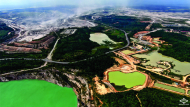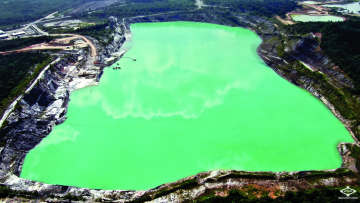Adaro’s rebrand: a fresh green look for the same dirty coal business
Camilla Perotti, Banks and Coal Campaigner at BankTrack | +31 (0)6 18283440
Apekshita Varshney, Climate Finance Campaigner at Ekō

Camilla Perotti, Banks and Coal Campaigner at BankTrack | +31 (0)6 18283440
Apekshita Varshney, Climate Finance Campaigner at Ekō
Anyone visiting the shiny new website of Alamtri Resources might wonder if Indonesia has a new green energy company. The site, replete with images of solar panels and wind turbines, carries slogans about "reinventing solar energy" and "utilizing the green ecosystem to accelerate national development." However, a closer look shows that its numerous subsidiaries still bear the name of its predecessor. Alamtri Resources is in fact Indonesia's coal giant Adaro Energy with a fresh new coat of paint.
In the last quarter of 2024, Adaro Energy has undergone a drastic restructuring to allegedly pursue more environmentally-friendly projects and position itself as a driver of the energy transition in Indonesia. However, this green pivot is proving itself to be nothing more than a greenwashing facade. This is why commercial banks should not see Alamtri as any more acceptable a client now than when it was called Adaro.
Adaro’s fresh new image
In September 2024, Adaro announced the decision to sell 99.99% of its shares in its thermal coal subsidiary, Adaro Andalan Indonesia (AAI). Adaro, whose coal mining and coal power generation business then accounted for 83% of its revenue, marketed the move as a green pivot and a way to raise funds for investments into “renewable energy projects”. One of these projects, touted as a green industrial park attached to a large hydropower plant, is in reality an aluminium smelter, complete with a captive coal-fired power station, with a hydropower plant planned for a later stage. This project is already causing forced evictions and the deforestation of pristine rainforest on up to 30,000 hectares of land in North Kalimantan.
Adaro admitted its primary intention was to become more appealing to a wider investor base, after several international banks, including BNP Paribas, Standard Chartered, Deutsche Bank, DBS, and OCBC, had already distanced themselves from the company and from some of its controversial projects (including the aforementioned smelter, which struggled to reach financial close after DBS, OCBC, and Standard Chartered backed out). Nonetheless, markets welcomed Adaro’s new direction, with shares immediately rising 15.1% after the spin-off announcement.
In November 2024, AAI’s shares were put on the market, in what became the biggest Indonesian IPO of 2024. It seemed that Adaro’s plan to raise USD 2.5 billion would undoubtedly succeed. On November 18th, shareholders approved the name change, and Adaro Energy Indonesia became Alamtri Resources Indonesia, aiming “to introduce its new identity as a parent entity that will have a stronger focus on green businesses and development of environmentally-friendly projects.”
2025: Adaro keeping its hands in the dirty coal business
For Adaro, then, the new year started with a new name and a new, fresh, green image. The image, however, clashes with reality, for a couple of reasons.
Firstly, despite all declarations and intentions, Alamtri still has an influential stake in AAI and its dirty coal business. Indeed, whereas the initial objective was to sell 99.99% of its shares, as of January 2025 Alamtri still controls 15.37% of the thermal coal subsidiary. Having a smaller stake in thermal coal will allow Alamtri to secure more funding from major international commercial banks, including some of those with stricter thermal coal policies. Considering the high level of interest in the IPO, Alamtri would likely not have struggled to sell the entirety of its shares. It seems the company made an active choice to retain a sizeable stake in AAI and keep its hands in the thermal coal business. A business that is still expanding: in 2025, AAI is targeting a production of 65.5 million tons of thermal coal, up 6.5% from 2023 production.
Secondly, AAI, sometimes also referred to as Adaro Indonesia, still appears in Alamtri’s corporate structure. This seems to indicate that, despite owning only a 15% stake in the company, Alamtri still considers AAI as part of the wider group. This is even more apparent if we consider who bought the rest of AAI’s shares: 41.10% is owned by PT Adaro Strategic Investments, a private company headquartered in the Adaro building in downtown Jakarta, also the majority owner of Alamtri, in which all members of Adaro’s founding consortium (the Thohir, Subianto and Rachmat families and the Saratoga Group) have stakes. A further 5.78% is owned by Alamtri President and CEO Garibaldi ‘Boy’ Thohir. AAI may not be any more fully under the direct control of Alamtri, but its future will still be mostly determined by the same people.
Furthermore, according to Alamtri’s website, AAI is still tasked with producing all the group’s thermal coal products, “trademarked Envirocoal to represent the coal’s very low-pollutant characteristics.” Besides the clearly greenwashed rebranding, the conglomerate clearly intends to remain in the coal business.
Finally, Alamtri’s strong ties to coal are even more evident if we look at another of Alamtri’s business pillars: Adaro Minerals. This subsidiary, 84% owned by Alamtri, consists of the company’s metallurgical coal assets, with 100% of its revenue derived from its met coal business. This business is showing no signs of slowing down and, instead, it is becoming one of the main sources of revenue for the company. In 2023, Adaro reported a 52% increase in met coal production over 2022, with 5.11 million tons produced. In 2025, Adaro Minerals is forecasting the production of 6 million tons of met coal. This shows Alamtri is still very much involved in the coal business, and proud of it, putting met coal at the forefront of its new diversified plans.
There is no strict categorisation between thermal coal and metallurgical (or coking) coal: the damage caused to the environment, public health, and the climate is absolutely the same. Indeed, the two types may be extracted from the same mine and, often, are interchangeably sold in the same markets. Alamtri, which expects to continue generating more than half of its revenue from coal until at least 2029, is keeping Indonesia tied to dependency on coal as a power source, when the science is clear that, to achieve the Paris Agreement’s 1.5° goal and net zero emissions by 2050, there should not have been any expansion of coal after 2021. Banks should recognise that behind the rebrand lurks the same dirty coal company, and should continue to avoid finance for Alamtri/Adaro until the company makes a genuine move out of all coal.


